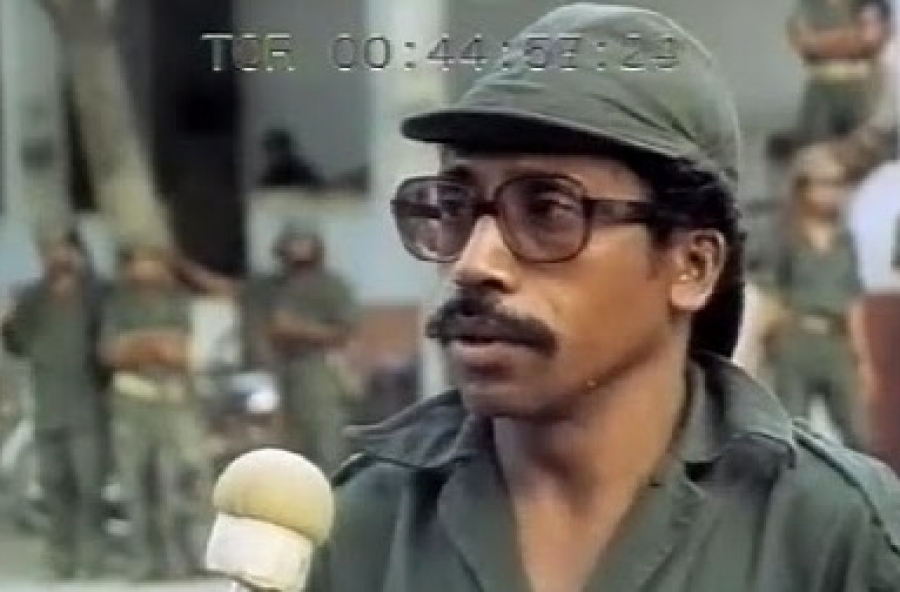The federal government is fighting declassification of documents which it argues may inflame already tense relations with Indonesia.
By Thea Cowie
Source World News Australia Radio
(Transcript from World News Australia Radio)
The Administrative Appeals Tribunal in Canberra has ordered declassification of a number of documents which the federal government argues may inflame already tense relations with Indonesia.
The Department of Foreign Affairs documents are believed to contain some information about a major Indonesian military offensive in the early 1980s which reportedly ended in the massacre of several hundred East Timorese civilians.
With the documents now more than 30-years old they should have been declassified some time ago, but until now they've been held back on the basis that the Archives Act exempts their release.
Thea Cowie explains.
(Click on audio tab above to listen to this item)
University of New South Wales Associate Professor Clinton Fernandes has been fighting for the documents' release for six-years.
Under a ruling made by the Administrative Appeals Tribunal this week most of the top secret files will finally be handed over.
Whether or not Dr Fernandes gets access to the rest of the documents remains to be seen.
The Tribunal will now hear from Australia's Inspector General of Intelligence and Security, who could block their release.
He could do this by arguing that declassifying the files could reasonably be expected to cause damage to Australia's security, defence or international relations.
Monash University Indonesian politics expert Professor Greg Barton says given the recent spying row, it's likely the documents' contents could inflame relations between Australia and Indonesia.
"This may make a currently difficult patch in the relationship much worse because it puts the focus back onto just how extensive our capacity is to listen in on Indonesian military and leadership and if anything it's capacity has improved since the 1980s. So if we come out looking like we were privy to everything in the early 1980s. It's going to be making people feel like they have to be making public statements in Jakarta saying this is intolerable and has to change. It's just plain embarrasing. Even if people know it and accept that this is the way the world is. It's embarrassing for it to come out in public."
Federal Attorney General George Brandis subjected the Administrative Appeals Tribunal hearing to what's known as a public interest certificate.
This meant that Dr Fernandes, his lawyer and the general public were banned from hearing evidence from the deputy director general of the Office of National Assessments, and other National Archives witnesses, not publicly identified.
But in open sessions, the Tribunal's president, Justice Duncan Curr, did outline some of the Archives' arguments for keeping the documents secret.
"One of the grounds for redaction ... is information supplied in confidence by a foreign government or a foreign government's agencies. Some of the issues would be in relation to documents that reveal the nature and extent of the intelligence relationships between Australia and Indonesia; and the third matter is the degree to which the disclosure of some of the material may affect foreign relationships between Australia and Indonesia against a background that all parties would accept as presently less settled than it has been in some recent time."
Dr Fernandes' lawyer rejected suggestions the documents' release could widen the rift between Australia and Indonesia or undermine security operations.
Lawyer Ian Latham told the tribunal many details about Australia's intelligence gathering techniques would now be useless given technological advances, and the passage of time would reduce Indonesia's sensitivity to the material.
That's a view supported by expert in East Timor politics at Swinburne University in Melbourne, Associate Professor Michael Leach.
"There are obviously sensitivities in the Australia Indonesia relationship today but I'm certainly not convinced that events of more than 30 years ago are likely to really undermine that. It's more likely to be recent and contemporary events that are capable of affecting Australia's relationship with Indonesia."
The Foreign Affairs files from late 1981 and early 1982 are expected to reveal how much the Australian government knew about Indonesian military operations at the time - including the so-called "fence of legs".
This operation involved more than 60,000 locals being conscripted to form human chains that moved across the land.
The military followed behind to flush out pro-independence guerillas from their hiding places.
The operation ended with a massacre, reportedly of several hundred East Timorese.
But Deakin University East Timor expert Damien Kingsbury says the information researchers really want is likely to remain top secret.
"So far it looks like a partial victory for Dr Clinton Fernandes. It's good that some of the documentation has been released and that some of the material is going to be put under consideration. It's very likely that given that we know some of the material will be redacted - or let's use proper language here, censored - it is likely to be that which is most sensitive."
Source http://www.sbs.com.au/news/article/2014/01/31/would-east-timor-documents-upset-indonesia
















Sem comentários:
Enviar um comentário